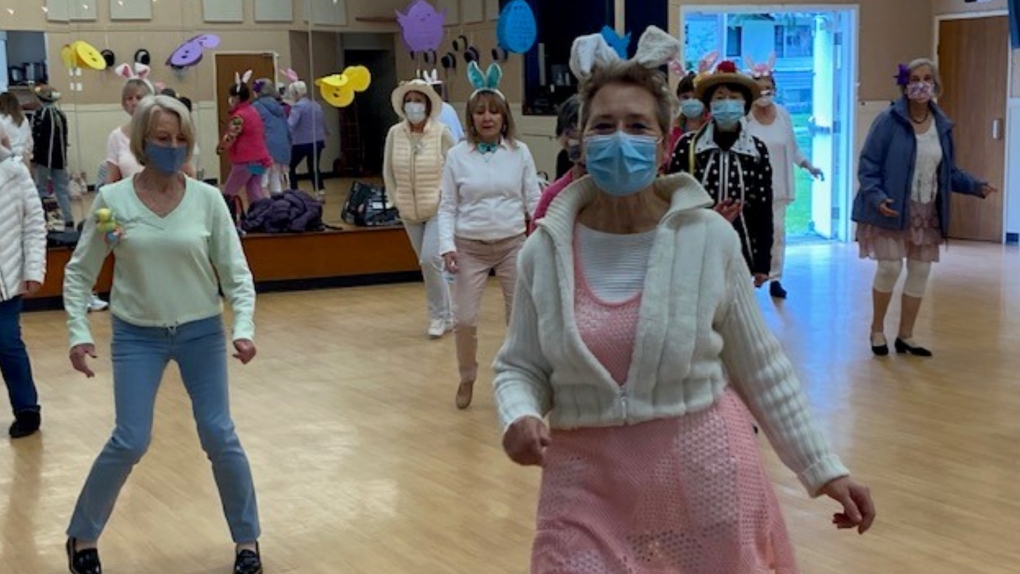Pandemic restrictions linked to rise in depression among seniors: study
There is, perhaps, a little extra pep in their step.
A seniors’ line-dancing class in Langley, B.C., that shut down due to the COVID-19 pandemic recently re-opened, and is back in full swing.
“Oh, I love it. Glad to be back,” said Bonnie Meisner, 72, who was attending class for the first time in two years after the pandemic combined with a cancer battle kept her away.
Though she saw family, social activities were out of the question, which left her feeling isolated.
“The only place I went was the cancer clinic,” she recalled.
 Many seniors had similar experiences, and a new study out of Simon Fraser University is providing more insight into the degree to which lockdowns and health restrictions have impacted the emotional well-being of older adults.
Many seniors had similar experiences, and a new study out of Simon Fraser University is providing more insight into the degree to which lockdowns and health restrictions have impacted the emotional well-being of older adults.
“We found that about 30 to 70 per cent was the increase in loneliness pre-pandemic to pandemic periods,” said Andrew Wister, director of SFU’s Gerontology Research Centre. He authored the study along with Laura Kadowaki.
“Women, especially those living alone, were part of the high-risk group,” he said.
According to the study, women aged 65 to 74 experienced a 67 per cent increase in loneliness in 2020. The proportion of them with depression also increased, from 19 per cent pre-pandemic to 23 per cent.
For men aged 65 to 74, loneliness increased by 45 per cent, while the proportion experiencing depression increased to 14 per cent, up from 12 per cent.
Other groups at higher risk include new immigrants, Indigenous people, LGBTQ2S+ individuals living alone or in remote areas, and “of course, those with mental health problems,” Wister said.
The researcher called the first wave of COVID-19 cases was “particularly problematic,” saying he believes there has been some positive adaption to the pandemic since then.
But he says that doesn’t mean we can assume things are OK.
“These problems are going to continue. They were there before the pandemic, the pandemic exacerbated many of these issues but going forward we have to find better ways of dealing with them,” he said.
Better digital technology education for older adults, expanding befriending programs and even virtual group fitness classes are among the suggestions to help with social isolation.
But back at the line dancing class, participants are grateful to be with their friends.
Participant Bernadett Valverde said she struggled with isolation during the lockdowns.
“The fact we could no longer attend church, we could not go to the civic center for line dance class or seniors centre … at times, I felt like why did this have to happen to me?” she said.
Peggy Thomson, 72, leads the dance classes at Brookswood Seniors Activity Centre in Langley.
She said for a period of time, classes took place in the parking lot. Eventually, they shut down altogether.
“I missed my busy life that I had doing this…It actually put me into a real downer because I couldn’t have that fun,” she said.
The report used data from a national long-term study following about 50,000 Canadians 45 to 85 years old for at least 20 years. The study was done for the Federal/Provincial/Territorial Ministers Responsible for Seniors Forum.
CTVNews.ca Top Stories

opinion Tom Mulcair: Prime Minister Justin Trudeau's train wreck of a final act
In his latest column for CTVNews.ca, former NDP leader and political analyst Tom Mulcair puts a spotlight on the 'spectacular failure' of Prime Minister Justin Trudeau's final act on the political stage.
B.C. mayor gets calls from across Canada about 'crazy' plan to recruit doctors
A British Columbia community's "out-of-the-box" plan to ease its family doctor shortage by hiring physicians as city employees is sparking interest from across Canada, says Colwood Mayor Doug Kobayashi.
'There’s no support': Domestic abuse survivor shares difficulties leaving her relationship
An Edmonton woman who tried to flee an abusive relationship ended up back where she started in part due to a lack of shelter space.
opinion King Charles' Christmas: Who's in and who's out this year?
Christmas 2024 is set to be a Christmas like no other for the Royal Family, says royal commentator Afua Hagan. King Charles III has initiated the most important and significant transformation of royal Christmas celebrations in decades.
Baseball Hall of Famer Rickey Henderson dead at 65, reports say
Rickey Henderson, a Baseball Hall of Famer and Major League Baseball’s all-time stolen bases leader, is dead at 65, according to multiple reports.
Arizona third-grader saves choking friend
An Arizona third-grader is being recognized by his local fire department after saving a friend from choking.
Germans mourn the 5 killed and 200 injured in the apparent attack on a Christmas market
Germans on Saturday mourned the victims of an apparent attack in which authorities say a doctor drove into a busy outdoor Christmas market, killing five people, injuring 200 others and shaking the public’s sense of security at what would otherwise be a time of joy.
Blake Lively accuses 'It Ends With Us' director Justin Baldoni of harassment and smear campaign
Blake Lively has accused her 'It Ends With Us' director and co-star Justin Baldoni of sexual harassment on the set of the movie and a subsequent effort to “destroy' her reputation in a legal complaint.
Oysters distributed in B.C., Alberta, Ontario recalled for norovirus contamination
The Canadian Food Inspection Agency has issued a recall due to possible norovirus contamination of certain oysters distributed in British Columbia, Alberta and Ontario.

































